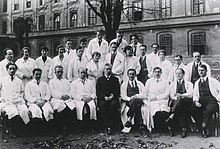Hans Hoff (psychiatrist)


Hans Hoff (born December 11, 1897 in Vienna ; † August 23, 1969 ibid) was an Austrian psychiatrist and neurologist .
Life
After completing his medical studies at the University of Vienna in 1918, Hoff worked as a secondary doctor (1922–1927) and as an assistant (1928–1932) at the clinic under Julius Wagner-Jauregg . In 1932 he became a private lecturer and specialist in psychiatry and neurology. In 1936 he was appointed head of the neurological department of the polyclinic in Vienna .
After Austria was annexed to Germany , Hoff had to leave the country due to his Jewish descent. He emigrated to Iraq, where he became professor of neurology and psychiatry at the Royal Medical School in Baghdad . After moving to the United States (1942), he became an assistant professor at Columbia University in New York. From 1943 to 1945 Hoff did military service in the Middle East and toured Afghanistan and Iran on behalf of the US government. 1945-47 he was Associate Visiting Neuropsychiatrist at Goldwater Memorial Hospital and Head of the Epilepsy Unit of the Baird Foundation Clinic and member of the Board of Directors and Medical Advisory Board of the National Association to Control Epilepsy in New York. In 1947 he became an Assistant Professor at Columbia University New York. In 1949 he returned to Austria as part of an initiative by the Vienna City Councilor for Culture Viktor Matejka . He initially took over the management of the Rosenhügel Hospital , from 1950 onwards, as the successor to Otto Kauder - as the only Austrian remigrant - head of the University Clinic for Psychiatry and Neurology at the University of Vienna, from the end of the 1950s at the latest - not only in the vernacular - also "Clinic Hoff "called. In the academic year 1961/62 he was dean, in the academic year 1962/63 he was vice dean of the University of Vienna. In 1969 he retired.
plant
Hoff wrote more than 500 papers on psychiatry and neurology, including ten books. In his scientific work, he was mainly concerned with experimental encephalitis studies, postural and positioning reflexes, psychosomatic problems, the influence of hypnotic orders on gastric and intestinal function, the psycho-vegetative circuit, the influence of psychological factors on endocrine glands, the function of the hypothalamus , the central nervous regulation of the metabolism and the endocrine glands, brain pathological phenomena, the function of the frontal lobe, the thalamus and the cerebellum, time-lapse phenomena, nervous vascular regulation, sleep studies, adrenal disorders in infectious diseases, epilepsy, multiple sclerosis and the question of psychopathy alcoholism.
In addition to his scientific research work, Hoff did pioneering work with his educational and educational work. He distinguished himself by giving lectures to medical circles and in the context of popular education. Hoff found a new method of rehabilitation for alcoholics and developed special psychotherapy for criminals. Hoff is considered to be the founder of the “Vienna Psychiatric School”, whose first concern was to humanize the clinics to guarantee the dignity of the mentally ill.
During Hoff's time as head of the clinic in Vienna, home children were treated with so-called malaria therapy , in which the patients were infected with malaria and suffered from high fever attacks.
Awards
literature
- Hans Hoff, in: Judith Bauer-Merinsky: The effects of the annexation of Austria by the German Reich on the medical faculty of the University of Vienna in 1938: Biographies of dismissed professors and lecturers . Vienna: Diss., 1980, pp. 103-106b.
- Jantsch, Marlene: Hoff, Hans. In: New German Biography (NDB). Volume 9, Duncker & Humblot, Berlin 1972, ISBN 3-428-00190-7 , p. 383 ( digitized version ).
Web links
- Hans HOFF (1897–1969): Displaced 1938 (52) In: VAN SWIETEN blog of May 21, 2008
- Entry on Hans Hoff (psychiatrist) in the Austria Forum (in the AEIOU Austria Lexicon )
Individual evidence
- ↑ STANDARD Verlagsgesellschaft mbH: The forgotten malaria victims of Vienna . In: derStandard.at . ( derstandard.at [accessed on July 29, 2017]).
- ↑ List of all decorations awarded by the Federal President for services to the Republic of Austria from 1952 (PDF file; 6.59 MB)
| personal data | |
|---|---|
| SURNAME | Hoff, Hans |
| BRIEF DESCRIPTION | Austrian psychiatrist and neurologist |
| DATE OF BIRTH | December 11, 1897 |
| PLACE OF BIRTH | Vienna |
| DATE OF DEATH | 23rd August 1969 |
| Place of death | Vienna |